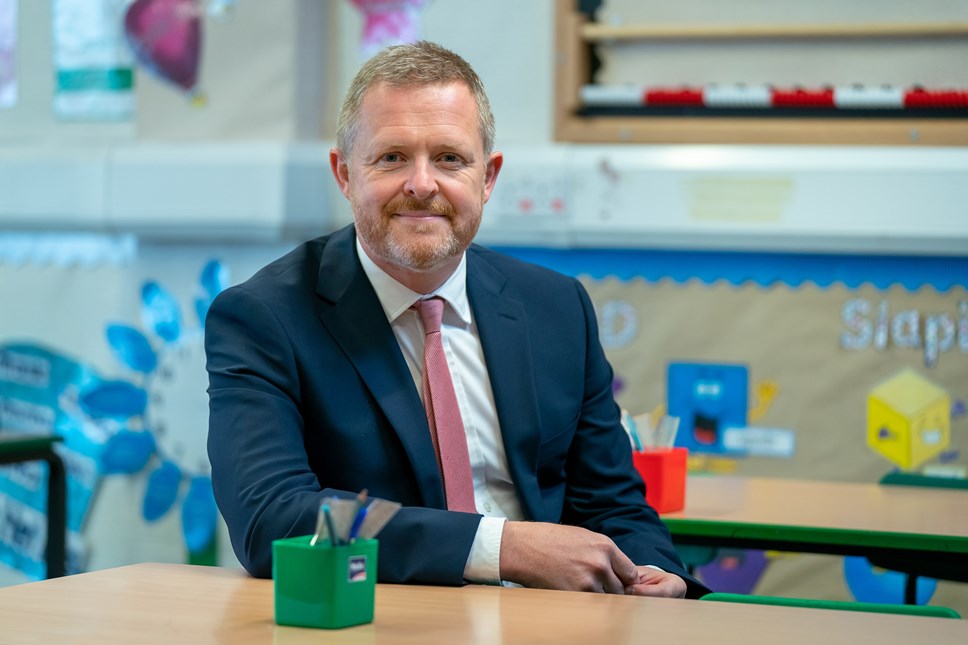
More support to press on with curriculum reform
Rhagor o gymorth i fwrw ymlaen â diwygio'r cwricwlwm
Jeremy Miles today confirmed he is to provide additional support for schools to enable the momentum behind the introduction of our new Curriculum for Wales to continue and to rollout in primary schools and non-maintained nursery settings from September 2022.
Recognising specific challenges faced by secondary schools, including managing a new system of assessment and supporting qualifications during the pandemic, the Minister announced that secondary schools would have the option to continue with their existing plans to start in 2022 with Year 7 or start in 2023 with Years 7 and 8 together.
Jeremy Miles, Minister for Education and the Welsh Language, also confirmed:
- The establishment of a National Network - a practioner-led body, open to all schools, that will support implementation of the new curriculum,
- £7.24m for schools to support their curriculum reform plans, including engagement with the National Network,
- The removal of the requirement to undertake end of foundation phase and end of key stage assessments, in the 2021-2022 academic year, for year groups that will be transitioning to the new curriculum in September 2022.
- An update of the ‘Curriculum for Wales: The journey to 2022’ document, recognising the current context and the different points many will be starting from. It will provide a comprehensive one-stop-shop for schools and settings.
Jeremy Miles said,
“My priority is to put learners’ well-being and progression at the heart of everything we do. Curriculum for Wales provides a once in a generation chance to revolutionise the quality of opportunity for our children and young people and I am determined we do not miss that chance.
“Through my discussions with the sector, it’s clear to me that there remains a strong desire for reform. I am determined that the emphasis on wellbeing and flexibility shown over the last year is built upon and closely aligned with the introduction of our new curriculum. I am therefore confirming today that the Curriculum for Wales will continue to be implemented in primary schools, maintained nursery schools, and non-maintained nursery settings from September 2022.
“I recognise that secondary schools have faced specific challenges such as managing qualifications, which, in some instances, have affected their readiness for curriculum delivery. I understand these concerns, and have taken the decision to provide some additional flexibility for schools where they judge that they need it. In 2022, schools which are ready to rollout the curriculum to Year 7 may do so, but this will not be mandatory until 2023, with rollout to Years 7 and 8 together.
“I would encourage secondary schools who are able to implement their new curricula in Year 7 from 2022 to move forward with their plans, supported by their regional consortia. Estyn’s recently published “What We Inspect” framework will enable this flexibility for providers and Estyn will be encouraging progress along the curriculum reform journey for secondary schools.
“The reform of qualifications will play a fundamental role in the success of our curriculum. The exciting ambition behind our curriculum must be matched by our qualifications system. The flexibility for secondary schools in 2022 will provide space for the sector to work closely with Qualifications Wales over the coming year to co-construct a high-quality set of qualifications which are aligned with the philosophies of the new curriculum, and to capitalise on emerging opportunities around assessment methods.”
Beyond 2023, roll out of the Curriculum for Wales will follow on a year by year basis, and the first qualifications designed specifically for Curriculum for Wales will be awarded in the 2026-27 academic year as planned.
Notes to editors
- The new Curriculum for Wales has been developed by practitioners through a network of schools, who worked in partnership with Welsh Government, regional consortia, Estyn, Qualifications Wales and a range of key stakeholders and experts to develop guidance, published in January 2020.
